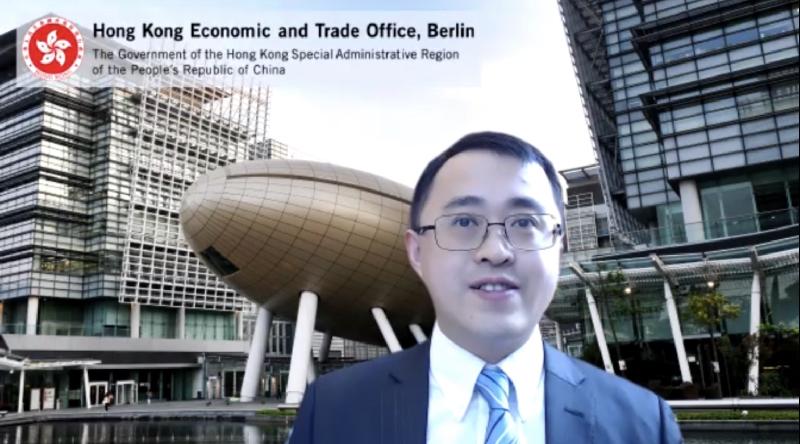The Hong Kong Economic and Trade Office, Berlin (HKETO Berlin), and THINKTANK, the Centre for International Relations (CIR), organised the online event "Is the Pandemic revolutionising Medicine and Life Sciences?" on June 29 (Berlin time) to discuss how the COVID-19 pandemic is accelerating global research and collaboration in medicine and life sciences. Top-notch experts from across the world shared their expertise and observations with the audience.
"Against the backdrop of the COVID-19 pandemic, global research and collaboration has certainly intensified", said Mr Bill Li, the Director of the HKETO, Berlin, in his opening remarks. As the virus knows no frontiers, the pandemic has fostered international co-operation and cross-border exchange of knowledge, medical equipment and vaccines. Tele-medicine also gained a strong boost and would likely continue to become a new trend. At the same time, Artificial Intelligence (AI) and robotics are becoming more important in processing the vast quantity of data related to infection, recovery, vaccination and mutants etc., which are all critical in formulating prompt solutions to the challenges we have been facing globally.
The fight against the pandemic is a global one and Hong Kong is well-positioned to be an important innovation hub for this undertaking. "With its proximity to Mainland China and strong support from the Government, Hong Kong is well positioned to develop innovation and technology. Major research and development (R&D) infrastructures such as the purpose-built
Hong Kong Science and Technology Park and Cyberport are helping to drive innovation and technology whilst the rigorous enforcement of intellectual property protection lays the foundation for commercialisation of research outputs for companies from Poland and beyond." Mr Li stated.
He continued emphasising that "The Government is promoting innovation and technology development along key areas including increasing resources for R&D, pooling technology talents, providing investment funding, providing I&T infrastructure, leading changes to procurement arrangements, and others. So far, the Government has committed over 100 billion Hong Kong Dollar (PLN 49 billion) to different initiatives in these areas."
Hong Kong is also one of the largest data storage hubs in the Asian region with significant computational power. It provides an ideal environment for the development and application of AI technology that will help keep COVID-19 in check.
The panel of experts for the webinar were –
• Professor Stefan ChÅ‚opicki, Director of the Jagiellonian Centre for Experimental Therapeutic, Faculty of Medicine, Collegium Medicum at the Jagiellonian University;
• Professor Andrzej Czajkowski, Professor at the University of Ottawa, Faculty of Science, Physics;
• Dr med. Tomasz Maciejewski, Director at the Mother and Child Institute, Poland; and
• Ms Jowita Michalska, Founder and CEO of the Digital University Poland;
• Professor Beata Nowakowska, Director of Cytogenetics Lab, Medical Genetics Department, Mother and Child Institute, Poland;
• Dr PaweÅ‚ Swieboda, Director General at the Human Brain Project, EBRAINS AISBL, Brussels;
• Professor Martin Wong, The Jockey Club School of Public Health and Primary Care at the Chinese University of Hong Kong;
• Dr. Wong Wing Nam, Chief Manager (eHR) of the Hong Kong Hospital Authority;
• Professor Michael Zochowski, Associate Chair, Experimental Biological Physics at the University of Michigan, USA.
About HKETO Berlin
HKETO Berlin is the official Hong Kong Special Administrative Region Government representative in commercial relations and other economic and trade matters in Poland as well as Austria, the Czech Republic, Germany, Hungary, the Slovak Republic, Slovenia and Switzerland.
Follow this news feed: East Asia






